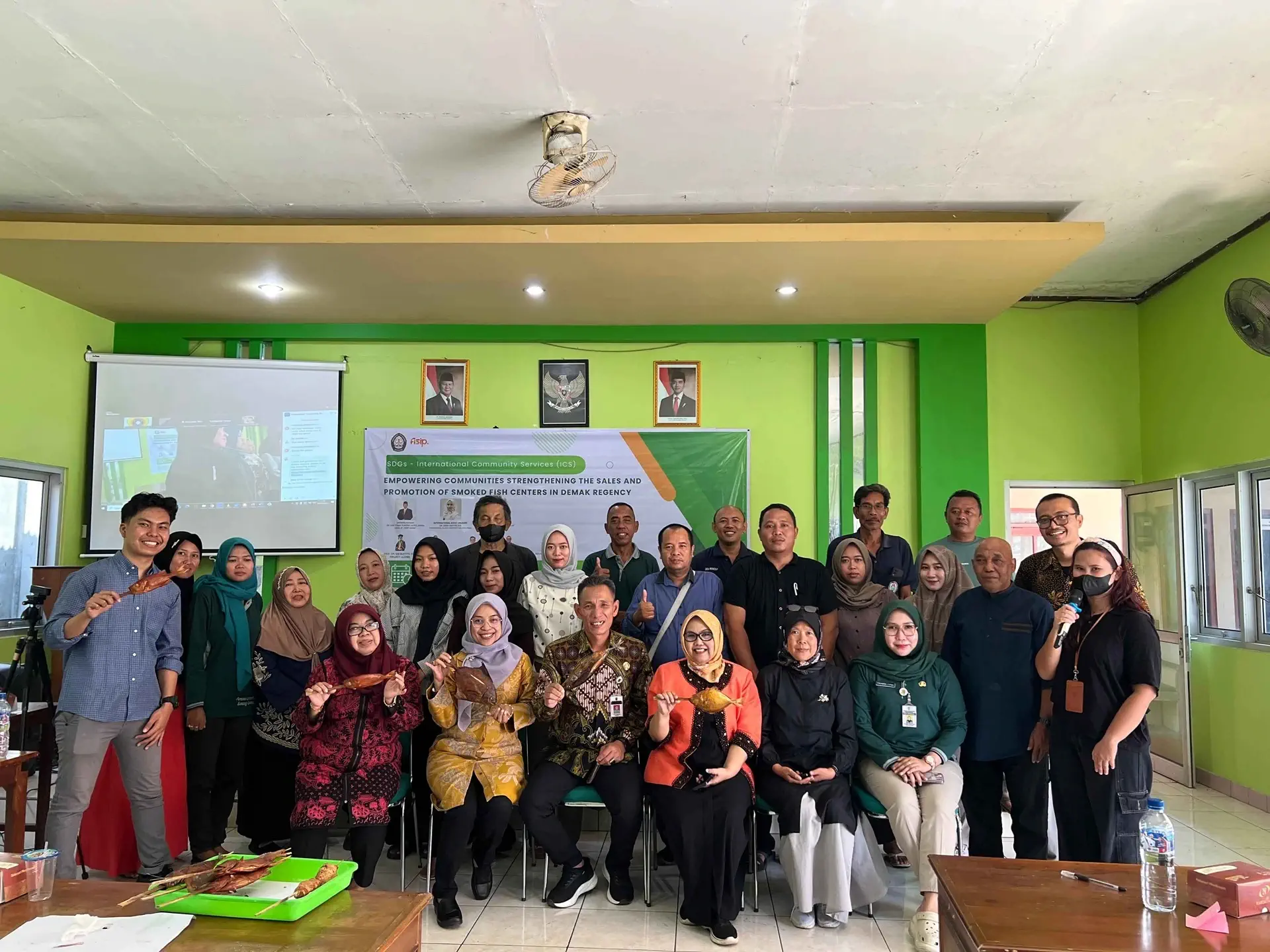Demak, July 4, 2025 — The Faculty of Social and Political Sciences (FISIP) of Universitas Diponegoro, through the Expertise Group (KBK) of Development Administration, Department of Public Administration, organized an International Community Services (ICS) activity titled “Community Empowerment in Fish Smoking,” held in Wonosari Village, Demak Regency. This event is part of Undip’s commitment to fostering international collaboration that directly benefits communities, while also reinforcing concrete steps toward becoming a World Class University (WCU) — not merely symbolically, but through the generation of new knowledge and enhancement of community welfare via transformative service.
The activity featured a keynote speaker from the International Islamic University Malaysia (IIUM), Dr. Irina Safitri Zen, an academic widely recognized for her expertise in empowerment and sustainability. She presented material on the importance of digital content in marketing local products, particularly in promoting smoked fish as a potential export commodity. Additionally, training was provided by Johnsen Hezron Gelora Kasih, S.A.P., a digital content practitioner and Master’s student in Public Administration as well as an alumnus of the Undergraduate Program of FISIP Undip Rembang Campus. He guided participants in creating promotional content using smartphones and the CapCut app, with a user-friendly and locally relevant approach.
The event was moderated by Renata Jati Nirmala, S.I.AN., MPA., and began with an activity report by Prof. Dr. Sri Suwitri, M.Si., head of the Development Administration KBK team. Opening remarks were delivered by the Head of Wonosari Village, Supanrejo, who welcomed the program as it aligned with efforts to develop village economies based on local potential. The Vice Dean for Academic and Student Affairs of FISIP Undip, S. Rouli Manalu, Ph.D., also delivered remarks emphasizing the importance of international collaboration in strengthening the tri-dharma role of higher education institutions.
This ICS activity was held in a hybrid format at the Wonosari Village Hall and was attended by 54 participants from various backgrounds, including smoked fish processors, village officials, Bakti Taskin Central management, Bakti Taskin Central Java, and regional coordinators from Demak and Jepara, as well as managers of the Merah Putih Cooperative. Academics from various universities in Indonesia and abroad were also present, such as Universitas Djuanda, Universitas Sriwijaya, Universitas Gadjah Mada, International Islamic University Malaysia (IIUM), and Universitas Diponegoro. Faculty and students from FISIP Undip served as active facilitators during focused group discussions and direct digital content creation sessions.
The main output of this activity was the production of social media content by the fish smoking groups in Demak, aimed at increasing the online promotional appeal of their products. Follow-up plans include ongoing assistance in digital marketing and the joint publication of academic papers between FISIP Undip and IIUM Malaysia, as part of strengthening international academic collaboration
The program was enthusiastically received by participants, who stated they had acquired new skills that could be used not only for smoked fish products but also for developing other local products. The Head of Wonosari Village, Supanrejo, remarked that the activity significantly enhanced the community’s digital promotion capabilities — an important asset in scaling up marketing efforts both locally, nationally, and internationally.
Through this International Community Services program, FISIP Undip has demonstrated that international collaboration can be realized not only through academic exchange but also through direct community empowerment. The program tangibly supports the achievement of the Sustainable Development Goals (SDGs), particularly Goal 17 on partnerships to achieve targets in poverty alleviation, zero hunger, quality education, good health and well-being, and strengthening the role of higher education institutions in building knowledge bridges that benefit society at large.

